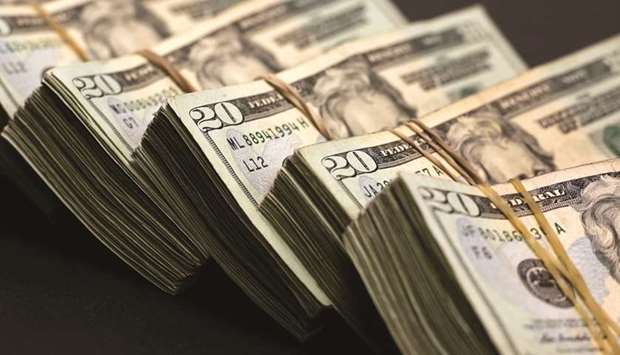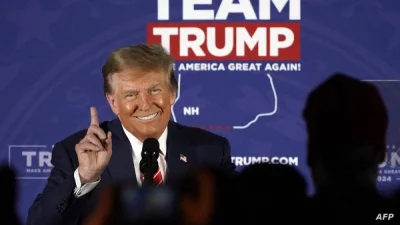President Donald Trump’s latest missives against China on Friday sent the dollar tumbling and fuelled chatter about a possible US move to weaken the currency.
Trump took to Twitter to bemoan a “very strong dollar and a very weak Fed,” and said that he’ll be responding to China’s latest round of tariffs later.
The greenback was already on the defensive after a speech by Federal Reserve chairman Jerome Powell reinforced expectations for another rate cut next month. But the dollar then sank against nearly all of its Group-of-10 peers, with its biggest losses coming against the yen, as Trump’s tweets fuelled speculation that the response may include direct action to weaken the US currency.
“The risk of FX intervention by the US has always been a distinct possibility,” said Calvin Tse, the head of North American G-10 currency strategy at Citigroup Inc. “After his comments this morning, I believe it is something he is seriously considering.” The offshore Chinese yuan tumbled 0.5% to 7.12 per dollar, touching its weakest level in two weeks.
The Trump administration formally labelled China as a currency manipulator this month, after the Chinese currency plummeted to a decade low.
Trump said this month that he doesn’t plan to devalue the dollar, as Fed rate cuts “would automatically bring down the dollar a little bit.” But his frustration with the pace of Fed easing was evident on Friday, when he tweeted after Powell’s remarks at Jackson Hole that “as usual, the Fed did NOTHING! It is incredible that they can “speak” without knowing or asking what I am doing, which will be announced shortly.”
Here’s what other currency analysts had to say: Jane Foley, head of foreign-exchange strategy at Rabobank: The market “certainly seems to think” that the risk of intervention is rising.
“It would almost certainly put Trump in a very awkward position” at this weekend’s Group-of-Seven summit, “given years of communiques that markets should set exchange rates”.
Simon Derrick, chief currency strategist at BNY Mellon: “This idea of intervention is obviously a fairly low probability at the moment, but what else is there for him to actually do that’s a surprise?”
“Action directly by the president to actually tackle dollar strength” would add a huge amount of volatility. “I know what I want to own. I want to own safe havens now”.
Steven Englander, global head of G-10 foreign-exchange research at Standard Chartered Bank: The move in gold and CNH suggests that the market sees intervention “as a possibility, but FX volatility would be a lot higher if that was the main fear”. The yuan is weakening because of the threat of tariffs, while other currencies are strengthening against the dollar because of “a bit of fear that currency comments from the US will intensify”.

Trump’s latest missives against China on Friday sent the dollar tumbling and fuelled chatter about a possible US move to weaken the currency


